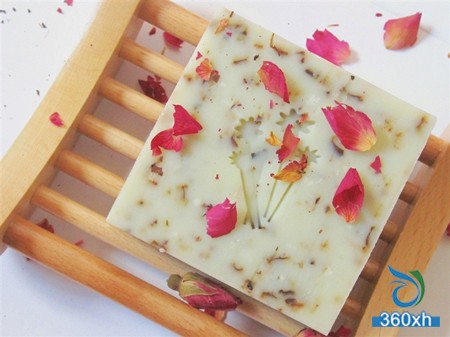Are you curious about what handmade soap is? If you're not sure, you might be left behind—many celebrities are now using handmade soap for their skincare routines. But does that mean it's easy to use? And more importantly, is it actually effective for washing your face? Let’s find out together with Xiaobian!

**What is Handmade Soap?**
Handmade soap is a product made by hand using natural ingredients. Typically, it requires three main components: oil, lye (sodium hydroxide), and water. The common materials used include glycerin, vegetable oils, and other skin-friendly substances. This type of soap is great for facial cleansing, removing makeup, and even bathing. It produces a rich, fine foam that effectively cleanses the skin by removing excess oil from pores. Unlike commercial soaps, handmade soap is free from harsh chemicals like preservatives and synthetic surfactants, making it gentle and safe for your skin.
**How Long Does Handmade Soap Last?**
Since handmade soap doesn’t contain chemical preservatives, its shelf life is shorter compared to mass-produced soaps. On average, it can last up to one year after being made. To extend its lifespan, store it in a cool, dry place. If you don’t plan to use it soon, you can keep it in the refrigerator, but make sure to use it within a year.
**How to Store Handmade Soap Properly?**
Because handmade soap contains natural oils and moisturizing agents, it needs proper storage. Avoid damp areas and use a well-ventilated container to prevent moisture buildup. Keeping it in a dry place helps maintain its quality and effectiveness.
**Why Is Handmade Soap So Popular?**
Handmade soap is loved for its high glycerin content, which deeply hydrates the skin while gently cleansing it. It’s also eco-friendly—once it’s disposed of, it breaks down naturally within 24 hours. Using handmade soap is a win-win for both your skin and the environment.
**Can You Use Handmade Soap on Your Face?**
Yes, handmade soap is suitable for facial use. However, be careful not to let it get into your eyes. If it accidentally gets into your eyes, rinse them immediately with water. It shouldn’t cause serious harm, but it may cause some discomfort temporarily.
**What Are the Benefits of Washing with Handmade Soap?**
Handmade soap is known for its strong moisturizing properties thanks to the natural glycerin it contains. It creates a rich lather that removes dirt and oil without irritating the skin. It also helps maintain the skin’s natural moisture barrier, leaving your skin soft, smooth, and glowing. Plus, it doesn’t strip away your skin’s natural oils like some commercial soaps do.
**What Should You Know Before Using Handmade Soap?**
Some people may experience dryness or breakouts when first switching to handmade soap. This could be due to the previous use of products with synthetic surfactants that disrupted the skin’s natural balance. When you start using handmade soap, your skin may feel tight or dry initially. This is normal as your skin adjusts. It usually takes around 20–30 days for your skin to adapt, as the skin renewal cycle is approximately 28 days.
After washing, pat your skin dry with a clean towel, then apply a mild, preferably plant-based moisturizer to help restore hydration. With time, your skin will become healthier and more balanced.
>>> Four skincare tips to help you achieve firm, radiant skin
Stock Pot,Stainless Steel Stock Pot,Stainless Steel Cooking Pot,Stainless Steel Bucket
Jiangmen Vanky Stainless Steel Products Co., Ltd. , https://www.vankystar.com
![<?echo $_SERVER['SERVER_NAME'];?>](/template/twentyseventeen/skin/images/header.jpg)